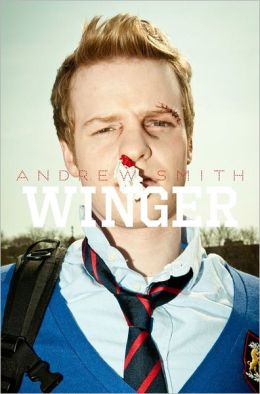When I saw Andrew Smith’s Winger at Chapters a few weeks ago – just for the cover alone – I
really wanted to read it. Winger is
about Ryan Dean West (Ryan Dean is his first name; he is more hesitant to share
his middle name) and follows him over the fall of his junior year at Pine
Mountain, a boarding school for rich kids. Before I read the book, it seemed
very similar to Jon van de Ruit’s Spud books,
about a boarding school in South Africa that focuses on the character of Spud
in particular. But I didn’t pick up the book right away, mostly because Andrew
Smith is also the author of The Marbury
Lens, a book I absolutely loved for its story and writing, but didn’t like
for its portrayal of female characters. But I picked up the book a week later,
and read it in two sittings, which was more than enough time to completely forget
about the comparison to Spud.
Ryan Dean West starts his junior year with the goal of
reinventing himself from the “bitch-ass” 14-year-old he is, two years younger
than anyone else in his year. He is at the top of his class and admits to
always making sure he gets a few questions wrong on a test in order to keep the
bell curve from being set too high for his classmates. When the book starts,
Ryan Dean is submerged face first into the toilet of his dormitory bathrooms,
already watching his goal of reinvention slide out of sight. This is the first
year that he’ll be living in O-Hall (Opportunity Hall), the dormitory that
students are sent to when they break the rules (Ryan Dean notes that almost
everyone is in there for fighting). Instead of rooming with his best friends
Seanie and JP in the normal dorms, he’s stuck with Chas Becker, big, mean, and
an asshole.
Ryan Dean also plays rugby for his school, and I really
appreciated Smith’s inclusion of the sport in this book, because it’s not often
that it’s at the heart of a YA novel (football and basketball are the two that
usually take precedence!). The games and practices provide a nice break in pace
from Ryan Dean’s narration, and also provide much of the conflict between Ryan
Dean and his friends. As one of the only openly gay students at Pine Mountain,
their captain, Joey, routinely gets in fights with the football team, and Ryan
Dean is one of the few who stand up for him.
Sam Bosma provides illustrations for the book, as Ryan Dean
describes his own experience with a mix of text and comic images. The story is
routinely funny and serious, and bounces back and forth between the two of them
in a way that is incredibly realistic for a high school experience.
But the problem of Smith’s female characters really took
away from the story, almost more than it did in The Marbury Lens. Ryan Dean is himself a sexist character, and
while this isn’t usually a problem in YA literature (because characters have
some awareness of their behavior and end up making a change by the end of the
novel), it is with Ryan Dean. For the first few hundred pages of the book, he
does not describe any female character without noting how hot or not hot she
is. But Smith’s female characters don’t ever get more than that “hot”
adjective; he doesn’t spend any more time on making them into dynamic
characters. This is completely opposite to how he describes male characters;
even Chas Becker has more depth than any female character.
And then there’s Ryan Dean’s love interest, Annie, who still
sees him as a young 14-year-old boy (and truthfully, that’s what he is, at two
years younger than her, and what 16-year-old girl would actually date a 14-year-old boy?). Yet when the unlikely romance does play out between
them (even though Annie says “I can’t be in love with you” constantly), and Ryan Dean goes home to Seattle with Annie for the
weekend, it becomes even more pained. Annie, for instance, makes sure Ryan Dean
brings a couple of pairs of his too-short pants back to her house with him so
that she and her mom can fix the hem. Smith writes, “That afternoon, Annie kept
her promise to fix my school pants, but her mom helped. So I stood there in the
‘sewing room’ in my socks and underwear doing the on-off routine with my pants
while hot Annie pinned and her hot mother worked the sewing machine.”
I usually love YA books with male protagonists. They usually
provide authentic, refreshing, and interesting points of view. And they can be
as crude as they need to be because there is still something genuine about
their male protagonists, something important and validating. Ryan Dean didn’t
ever change from being a 14-year-old junior who thought he deserved perfection
in every area of his life, who objectified the girls at his school while still
expecting them to fall in love with him and make all his sexual fantasies come
true. He doesn’t reinvent himself. He doesn’t change even a little bit.
I wanted to really, really love this book, but I just couldn’t
ever invest enough in the story, because when I did, all I ended up with was
another sexist, objectifying comment that took me right out of it again. For
Joey and Seanie and Chas, the boarding school setting, and ending, Winger is a really good book. But
without a single well-rounded female character, it was a miss for me.





No comments:
Post a Comment